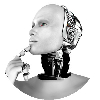AI wins big at the Nobels
 T he scientific Nobel prizes have always, in their way, honoured human intelligence. This year, for the first time, the transformative potential of artificial intelligence (AI) has been recognised as well. That recognition began on Tuesday October 8th, when Sweden’s Royal Academy of Science awarded the physics prize to John Hopfield of Princeton University and Geoffrey Hinton of the University of Toronto for computer-science breakthroughs integral to the development of many of today’s most powerful AI models.
T he scientific Nobel prizes have always, in their way, honoured human intelligence. This year, for the first time, the transformative potential of artificial intelligence (AI) has been recognised as well. That recognition began on Tuesday October 8th, when Sweden’s Royal Academy of Science awarded the physics prize to John Hopfield of Princeton University and Geoffrey Hinton of the University of Toronto for computer-science breakthroughs integral to the development of many of today’s most powerful AI models.
This article appeared in the Science & technology section of the print edition under the headline “Honouring intelligence”
Discover stories from this section and more in the list of contents
Solutions include bendy propellers and “acoustic black holes”
Medaka catch rides on obliging birds, confirming one of Darwin’s hunches
The award honours protein design and the use of AI for protein-structure prediction
The award, to Geoffrey Hinton and John Hopfield, stretches the definition of the field
These tiny molecules regulate genes and control how cells develop and behave
Models look for sound patterns undetectable by the human ear
https://www.economist.com/science-and-technology/2024/10/10/ai-wins-big-at-the-nobelsA source: www.economist.com/science-and-technology/2024/10/10/ai-wins-big-at-the-nobels


 Advertising on our project is a great way to promote a brand and attract new customers for your company!
Advertising on our project is a great way to promote a brand and attract new customers for your company!  AUD: 0.6715 $
AUD: 0.6715 $  CAD: 0.7238 $
CAD: 0.7238 $  CHF: 1.1598 $
CHF: 1.1598 $  CNY: 0.1405 $
CNY: 0.1405 $  EUR: 1.0903 $
EUR: 1.0903 $  GBP: 1.3080 $
GBP: 1.3080 $  JPY: 0.0067 $
JPY: 0.0067 $  RUB: 0.0103 $
RUB: 0.0103 $ 




























